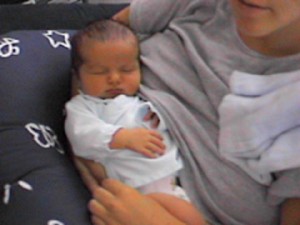
When I was pregnant with my first child, ten years and a million sleepless nights ago, I went about pregnancy the same way I had gone about my college courses: by reading everything I could get my hands on, studying notes, attending classes, and joining message boards. I was always a great student — and definitely an overachiever — and now I intended to get an A-plus in Motherhood 101.
In the age-old tradition of pregnant women, I tried to hide from the little old ladies in the grocery store aisles that would tut-tut over my swollen belly and try to corner me. Everyone wants to give a pregnant woman not only advice, but also their stories — often the worst stories they can muster on short notice: the epidurals that didn’t take, the colic that went on for months, the lack of sleep, the body that was never the same. I rolled my eyes, smiled and nodded politely, and lumbered on my merry way, smug in my assurance that as I had read Harvey Karp and Penelope Leach and Dr. Sears, I would be immune to such vulgarities. These women, I told myself, were just trying to scare me.
I diligently attended my birthing classes, toured the hospital, and dragged my husband to the breastfeeding prep class. I washed all the bodysuits and the gowns in hypoallergenic, dye- and scent-free detergent. I practiced my kegels.
Then, I had a baby.
And, like postpartum women everywhere, I found myself in my bed, body fluids oozing from far and near, stitches in places I didn’t know I had, my breasts growing at an exponential and alarming rate, my hormones crashing down around me, and all I could think was, “Nobody told me about this. There was no chapter that said anything about this!”
“Why didn’t anyone tell me?”
The answer is simple: because I didn’t want to hear it. There’s no conspiracy, no oath of silence. There’s no magic wand that renders those who have already walked the path of a first-time mom unable to remember its sometimes dark and dirty twists and turns. No, we all remember. We remember, and we would like to help those about to face the experience. But we know our words would fall on deaf ears.
The truth is, when I was pregnant, I only wanted to talk about pregnancy and childbirth and strollers and Diaper Genies. No one told me that birth was only, literally, the beginning. I can’t blame a universal motherhood conspiracy, though; I would not have listened. I naively assumed the rest would just fall into place because I had studied up. Here are ten things I wish someone had told me — and I wish that I had heard:
1. The first time you see or hold your baby, you might not hear angel choirs in the distance. You might have a doctor still halfway up your body stitching you, or a nurse pumping your stomach to help you deliver your placenta. You might be in a lot of pain. You might be more exhausted than you have ever been in your whole life. It’s okay if you don’t hear the angels. There will be time to have those magic moments with your new baby.
2. After you deliver, your first trip to the bathroom will be an event. Don’t be embarrassed to let someone help you there; do not risk passing out alone. Be prepared that this is only the beginning of your loss of dignity as a mother. After all, you will have years ahead of you during which you will not be able to visit the potty alone. Might as well start now.
3. Breastfeeding is hard. It takes a little while to get used to the “holds” and find the one that works best for you and your likely hysterically screaming newborn. Whether you are doing it right or not, breastfeeding hurts at the beginning. Sometimes a lot. My nipples cracked and bled with my first baby. Engorgement was scary and extremely uncomfortable. My breasts radiated heat and actually pulsed. But my lactation consultant was my knight in lanolin-coated shining armor, and after the first two weeks, breastfeeding became more comfortable and much more manageable. Also: if breastfeeding is not for you or if it just doesn’t work out, that is — REALLY — fine. In the end, the way you feed your baby is inconsequential compared to the way you love your baby.
4. On your fourth day postpartum, you will most likely cry. A lot. This is usually when your hormones crash. This is the day when you will be certain that your life is over, that your partner is a jerk, and that you cannot do anything right. You’ll cry just because. You’re allowed. (BUT — if you continue to cry and continue to feel down, seek help pronto.)
5. If at all possible, do not put on real clothes for at least two weeks. Once you get out of your pajamas, people start expecting you to be competent. Wear clean, fresh pajamas if you must, but stay in our pajamas unless you want to cook and clean and entertain visitors along with the bleeding, oozing, leaking, and caring for another human life parts of the first two weeks.
6. Babies don’t always sleep. This is not the result of Something You Did Because You Are Already a Failure as a Parent. These same babies will, eventually, sleep. Promise. You cannot ruin them for life. Other parents will tell you their babies are sleeping. I promise you they are a) stretching the truth, b) defining “sleep” differently than you do, c) still due for sleep disruptions, or d) flat-out lying. You will face these same alternate versions of parental realities again when you talk to other parents about potty-training and reading with other parents further down the road. Seriously, babies are as different as adults. Some sleep better than others. But they all struggle sometimes. Your child will sleep sooner or later.
7. Don’t let anyone make you think you don’t know your own baby best, and don’t let anyone make you think you’re not doing a good job. There is no one right way to parent and there are many ways to be a good parent. Related: You don’t have to do what your mom, mother-in-law, or grandmother did. Listen to your gut.
8. Find support — neighborhood groups, breastfeeding groups, hospital new mom groups, whatever you can find. Networking with other new mothers can be a crucial lifeline, even if you go back to work after your maternity leave. Having a newborn is like going off to college for the first time — you need to find other newbie freshmen so you can all be clueless together.
9. Don’t be a martyr. Kids don’t visit martyrs for the holidays when they grow up. Hire someone or beg your friends to come and hold the baby while you shower and nap sometimes. It’s not easy to adjust to being a mom. One day, you are a person just taking care of yourself; the next day, you can’t button your shirt straight. Don’t be afraid to say, “This is hard,” or “this sucks!” It is hard and it does suck sometimes. That doesn’t mean you aren’t 110% grateful for the blessing of a baby or completely in love with your child.
10. Take lots of pictures (and get in them), because you won’t remember much of this later. Trust me.
More than anything, I wish someone had told me this: the first year of your first time being a mother is like nothing you will ever experience again, no matter how many children you have. Every day is a miracle. Every day is a journey. Every day might seem like it lasts 100 hours. There are lights at the end of every tunnel, but you won’t know it. You will never again feel like you are getting an A-plus. You will be forever changed. At some point, you will realize that “nobody ever told you” because some things you have to experience for yourself; there’s no book or class or even little old lady in the grocery store who can tell you what to really expect when you’re expecting.
What do you wish someone had told you before you had your first baby?


I love this list. My first reaction is to be surprised, because I suspect you and I were very similar as students. Yet somehow I had the opposite response to pregnancy – I read some of the books but rejected many of them, I switched medical practices at 29 weeks, I took my mother’s advice that I really only needed some diapers and a bureau drawer for when the baby was born. And yet, and yet. As you know I crashed as well. Maybe how we prepare is just utterly irrelevant. (I find myself wishing we’d known each other then, since we could have gone through this together; I think much of my reaction was about frank disbelief, aided and abetted by the paucity of peers I had). But I wish someone had told me not to expect the angels, most of all. Or at least that NOT hearing the angels didn’t make me a bad mother. You know? xoxo
Allison, when I quickly replied to you on twitter, I had not yet read this. So funny that you say almost the exact same thing here!
Agreed on so many things. My big ones are: trust your instincts; the people that claim motherhood bliss on Facebook are lying (everyone, every single mother, has cried on the bathroom floor. promise); it gets better, no phase lasts forever; and my biggest one: stop expecting your to “get your life back”. Once I accepted that my life would not get back to “normal”, once I accepted that this was in fact, the new normal, I actually began to be able to appreciate my “new” life.
And yes, I was shocked, shocked by the continuing indignities of the postpartum world. I was so focused on labor that I didn’t even consider what came after. And it’s a slap in the face, after all that hard work of growing a baby and pushing it out, to then be confronted by such alien grossness. But it’s just part of it, and now I’m one of those veterans that just smile knowingly when a new mom is like “why didn’t anyone TELL me about this?” Because as you say, they won’t believe me. And because I figure it’ll happen anyways, why ruin those blissful days of ignorance?
Great list, definitely passing this on.
All SO true. And what is it about day 4??? With all four of my kids the crying sort of started right there at day 4. And happened some time every day until around the four week stage when the fog slightly lifts. Slightly but enough. I know for many women it does on much longer. I feel very lucky.
Oh man, of all those, the only one I REALLY REALLY desperately needed was number 3. The part about “if it doesn’t work out, that is FINE.” I read the books, watched the videos, and went to the breastfeeding classes. That message was never offered and needed to be. The only message I got was, “No matter what your problem is, the lactation consultants can get you through it and you WILL be successful.” Well, I probably could have been successful, but after three bouts of mastitis with 104+ fevers, chills, and feeling like I had the worst flu ever, unable to take care of either myself OR my baby, success just didn’t seem in the cards. After being hospitalized for several days, cup feeding my newborn for fear of nipple confusion, I still only had the message, “You WILL be successful.” I just wasn’t, and the mommy guilt wracked me to my core. It finally took two people to get me through it… my cousin (10+ years older and wiser) said, “Breastfeeding is great if it works, but you know what… my kid is in 5th grade, and there’s no way I could tell you who in his class was breastfed and who wasn’t. It seems like a huge deal now because that is the only thing you have to focus on, but 10 years from now, it won’t make a difference in the world.” Another friend said, “mommy guilt just shows that you care and want the best… but don’t let it get to you. Do what is best for you and your family.” THOSE are the messages I needed pre-baby. The breastfeeding nazis who ran all the classes NEVER gave the option of stopping breastfeeding. Their only message was to charge through anything. Charging through a 4th bout of mastitis just wasn’t something I could face, and NOW I know that’s FINE. Stopping was the right decision for my family, but it sure didn’t feel like it when I made it. It just felt like utter failure.
I also like number 1 about it being OK if you don’t hear the angels sing!! 🙂 You watch those baby story TV shows and think everybody gets that baby put on their chest and cries tears of joy. I was vomiting like crazy and made them take the baby away so I wouldn’t puke on her! Not exactly how I pictured that first moment!